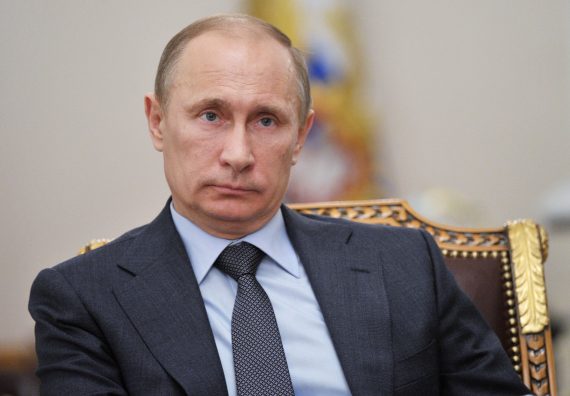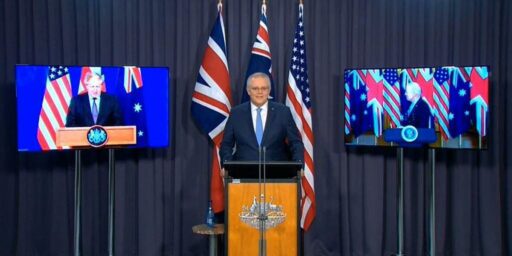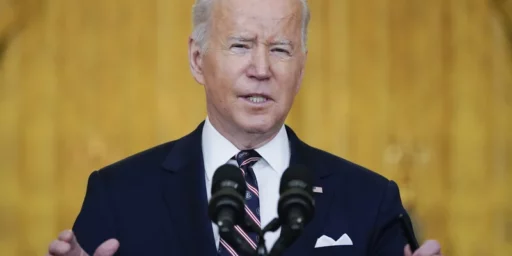Putin Makes Waves At G-20 Summit Over Ukraine, Reportedly Leaving Early
Vladimir Putin's reception at the G-20 Summit in Australia has been less than warm thanks to recent events in Ukraine.
Russian President Vladimir Putin is reportedly set to leave the G-20 Summit in Australia early after what can only be called a frosty reception from many of the western leaders present for the meeting:
Vladimir Putin is set to leave the G20 summit early after a tense meeting with David Cameron over Moscow’s actions in Ukraine.
The Russian president is reportedly planning to leave the summit early on Sunday and miss its official lunch in response to repeated criticism from western leaders.
The move comes after Tony Abbott, the Australian Prime Minister, threatened to “shirt front” Mr Putin – a form of physical confrontation. Stephen Harper, the Canadian Prime Minister, told Mr Putin: “I guess I’ll shake your hand, but I’ll only have one thing to say to you – get out of the Ukraine.”
Mr Cameron told Mr Putin that he is at a “crossroads” and could face further sanctions after the pair held “robust” discussions on Ukraine.
During a tense 50 minute meeting Mr Cameron warned that Russia is risking its relations with the West and must end its support for Russian separatists.
Mr Putin denied that Russian troops have entered Ukraine and claimed that he is prepared to accept a ceasefire and stop the flow of Russian weapons across the border. He also said that he is prepared to recognise Ukraine as a “single political space”.
Mr Cameron is said to be “realistic” about Mr Putin’s comments after he previously broke pledges to end Russian action in Ukraine.
The meeting at the G20 summit in Brisbane, Australia, follows a tense build up in which Mr Cameron compared Russia to Nazi Germany.
Tensions escalated further when Russia stationed a fleet of warships off the coast of Australia in an apparent show of strength ahead of the summit.
In interviews hours before the meeting, Mr Cameron suggested that he cannot trust Mr Putin and described Russia’s decision to send a fleet of warships to Australia as “international machismo”.
Asked if he trusts Mr Putin, the Prime Minister told ITV News: “I take people as I find them. The sad thing is that to date undertakings given in the Minsk agreement have not been followed but the right thing to do is to continue to engage.
“So far we haven’t seen his actions follow up the statements that he’s given on previous occasions.
“The point is and the reason for meeting is that this issue matters and it’s very important Russia understands what’s at stake and gets a very clear message.
“There’s a real choice here, there’s a different and better way for Russia to behave that could lead to an easing of relations, but at the moment he’s not taking that path.”
On some level, one has to wonder if Putin showing up at the summit wasn’t some kind of stunt for domestic consumption to begin with. With reports of Russian troops and equipment pouring across the border with Ukraine that seem hard to deny, and the whole idea of showing up with a fleet of Russian destroyers in international waters off the Australian coast, much further from Russian waters than the Russian Navy tends to travel these days, certainly seems like more Putin-esque showmanship and provocation. It’s almost as if Putin went to Australia with the specific intention of creating a scene like this for propaganda purposes back home.
In any event, the reports about Putin leaving the summit early are being confirmed by Reuters, so I suppose we must make of them what we will. At the very least, all of this must be added into Putin’s behavior all year, which started largely in the immediate aftermath of the Winter Olympics, which Russia first began setting its sights on the Crimean Peninsula. After that, Russia responded to the ouster of the pro-Russian leader of Ukraine by openly backing pro-Russian separatists in the eastern part of Ukraine, to the point of providing them with the kind of advanced weapons systems that were capable of bringing down a passenger jet flying at somewhere approaching 30,000 feet in the air. When the time came for the Ukrainian President to attempt to negotiate a cease fire in the east, it was clear that the real power in the room speaking for the other side was not the rebel groups from Donetsk and elsewhere, but the Russians and, to the extent the cease fire did hold, it appeared to only hold because it was in Russia’s interests that it do so. Now, that cease fire seems to be nothing but words and the war seems to be back on even as Ukraine heads into a its usual long, cold winter.
What the Russian leader’s intentions are here are, as always, not clear, but the news certainly doesn’t sound good. In addition to Russian actions in Ukraine, there have been threats against Estonia, Moldova, and Kazakhstan. There have been several reports of Russian forces that are at the very least capable of being nuclear being moved into Crimea, putting them right on Ukraine’s doorstep and, of course, much closer to NATO territory. Sweden spent much of the month of October searching for what was believed to be a Russian submarine in the waters off its coast. And, of course, there have been numerous reports over the past several months of Russian airplanes resuming old Cold War positions near Alaska and over Europe and, most recently, reports that Russia will be flying long range bombers on patrols in the Gulf of Mexico. If nothing else, all of this seems guaranteed to raise tensions with the West in general and the United States in particular and, considering that this is coming in an era when Russia is in a far less advantageous position strategically than it was even during the height of the Cold War, it’s hard to see how Putin believes he will come out ahead here.
Naval War College Professor Tom Nichols, who has written about and studied Russia since at least the final days of the Cold War, took a stab at trying to figure Putin out back in September:
Putin made a show of transiting to nationalism, just as many former Soviet Communists did after 1991. Some succeeded in pulling it off, and rule some of the USSR remnants to this day. For his part, Putin wears a cross, makes a great show of his concern for Russian-speakers, and generally encourages Russians to wear big “I love Russia” shirts. It’s a cheap nationalism that really asks no price, at least until now.
Aside from these showy moments, however, we have no real evidence Putin is a nationalist. Rather, he has used his considerable power to build Soviet, not Russianmonuments to power. He has funded new generations of nuclear missiles. He set up a Potemkin village to host the Olympics. He scrubbed Soviet history clean in school textbooks. He is obsessed with Russian speakers, to be sure, but only if they reside in lands once part of his beloved USSR. It makes no difference to him whether those people are better or worse off than they were under Soviet rule; they are merely markers that allow him to lay old Soviet claims. In some cases (like Belarus, a shabby little post-Soviet dictatorship) a closer union is merely a costly symbolic project that makes no real difference to either country.
If anything, Putin probably finds Russian nationalism as alien as he finds any other; the best evidence for this is that he has muscled aside nationalist propaganda and nationalist political figures and replaced them with his own cult of personality. He has tamed far-right nationalist groups and welded them to his neo-Soviet expansionism. He has taken one-time nationalist hardliner Vladimir Zhirinovsky and made him into the official Court Jester of the Kremlin.
Likewise, Putin displaced the Communist Party of Russia—a damaged brand if ever there was one—by functionally replacing it with his own Putinist vehicle whose aims are hardly different. (Gorbachev once called Putin’s “United Russia” a “bad copy of the Soviet Communist Party,” and that’s a man who learned the hard way when a party is rotten to its core.)
Putin’s speeches and public utterances tend to show more nostalgia for his Soviet youth than his Russian adulthood. To see the world through Putin’s eyes, look no further than the explosion of bad taste and Soviet kitsch that opened the hot mess known as the 2014 Sochi Olympics. In a display of love and affection for all things Soviet that might have brought a tear to Leonid Brezhnev’s eye,Sochi’s opening ceremony was everything people like Putin remembered about the USSR but that no one really experienced: the dynamic technology, the pretty girls bustling to new futures, the camaraderie of being part of the big Soviet experiment.
It’s all stuff you might miss if you’re a former KGB spook.
This theory about Putin being a guy who longs for the days of the old Soviet Union has been around for some time, of course, and you largely see it being dismissed by some of the more conventional Russia “experts” that get trotted out by the media. As Nichols notes, though, the theories we hear from them about Putin being some kind of foreign policy “realist” or simply a new kind of Russian nationalist, with some even suggesting that he sees himself as some kind of 21st Century version of the Tsardom deposed in 1918, don’t really make much sense when you compare them to how he behaves. If Putin is a realist, then why does he often pursue actions that are, viewed objectively, so seemingly irrational? If he’s a nationalist, then why does he pursue a course of action that, in the long run, is seemingly only guaranteed to weaken Russia’s relevance on the world stage, especially given the fact that nations like China and India are so clearly surpassing it when it comes to economic growth and international influence? To some extent, you can dismiss some of all this bravado of his to things intended to for domestic consumption, to build up what he obviously wants to be a Putin “cult of personality,” but that’s also something that’s more akin to someone who sees the days of the Soviet Union as some kind of golden era for Russia than it is someone who wants to see Russia move into the 21st century.
The dangerous thing about Putin’s unpredictability and often quite opaque motives, of course, is that it could all very easily lead to miscalculation on both sides of the ball. The Russian leader, for example, seems to be very close to over playing his hand when it comes to Ukraine and the leverage that Russia’s energy stores give him, especially in the light of declining worldwide oil prices that are sure to have a negative impact on Russia’s economy. He also seems to be banking on the idea that the west isn’t going to do much to stop him, but that gambit doesn’t seem to be playing off very well. President Obama, British Prime Minister Cameron, and Canadian Prime Minister Harper certainly have upped their rhetoric against the Russian President of late, and the downing of Malaysian Airlines Flight 17 seems to have been something of a game changer in Europe. Confronting Ukraine in the east seems to have only succeeded in having pushed the government in Kiev closer to the west at a more rapid pace. At some point, Putin may find that he has crossed a line that leads to something more. A shooting war between the West and Russia in Ukraine is unlikely, of course, but if Putin believed that the West would simply be the paper tiger that the Soviets believed it was in the 1970s, I suspect he will be in for a surprise. More dangerous, of course, are the increasing number of close calls between Russian planes and ships and western forces around the world. We had similar encounters during the Cold War, of course, but back then everyone knew what the game was and they never amounted to anything. Do those old rules hold true today? I don’t know, and I’m not sure the men flying the planes do either.
Anyway, this latest G-20 incident is just another in a long list of odd behaviors on Putin’s part this year. What his intentions are, or if he even has a plan, is something only he know at this point.







It just doesn’t seem like Putin, or the Russian people who back him, are up to the task of engaging with world affairs.
The American president parks warships off the coast. He is told, to his face, by rival leaders to “get out of Iraq/Afghanistan.” He DOES NOT leave the conference early like a powerless child.
Good to see western leaders behave like children, telling other kids what they’ll do to the guy if he dares to come around. Makes Kissinger look like a wise, mature statesman.
This is an absurd statement. Putin fits into the Russian intellectual tradition of liberal conservatism.
But when the U.S. actually violates Chinese and Russian territory it comes in for no criticism whatsoever. American ships and planes have regularly done so for over sixty years.
I think the best summary I heard was one Russia expert on NPR commenting that Putin has a great tactical mind (how do I take over Crimea?) but is extremely bad at strategy (is taking over Crimea a good idea?) and thus constantly seems to be surprised by relatively predictable long term consequences of his actions.
Putin just can’t lay down a bad hand. He thinks he is a good poker player, but everyone knows first rule is you have to fold a bad hand. But he continues to bet and bet. His ego is getting the best of him. Eventually the guys backing him will stop giving him chips considering they are hurting from these sanctions. All over something as insignificant as the Ukraine. (Queue the Subway scene on Seinfeld with Kramer and Newman playing risk)
I think @Stormy’s quote has it right. Putin is clever but not smart. He’s tough but not strong. Unfortunately he’s very much in line with all of Russian/Soviet history. Has Russia ever managed to govern itself well? Has it ever not been a pain in the ass? They lurched from Czarism to Communism to Oligarchy and now to Fascism, like they’re taking the grand tour of failed governmental systems.
The limitation on the usefulness of imposing suffering comes from the fact that the Russian people are beasts of burden. They aren’t Americans or Brits or Frenchman or Germans: Russians take to suffering because suffering is all they’ve ever known. They’re the abuse victims of history, forever beaten on by their drunken, stupid and incompetent leaders and now incapable of anything else.
He does look as though he just ingested a bowl of really bad borscht, doesn’t he?
His actions are quite rational if one looks at them from an eastern perspective. It’s the U.S. and EU that were just frozen out at APEC not Russia which, along with China got almost everything it wanted from the conference. A new asian economic bloc and alliance is well underway.
Dunno if he wants to recreate the Soviet Union, but he definitely wants back the majority Russian parts. That means eastern Ukraine at the very least, although I think the Baltic republics could also be on the menu.
Frankly, it’s 50/50 that he can get a chunk of east. Ukraine, so it’s not at all clear he is playing a losing hand here.
@Ben Wolf:
I don’t see anything in Putin’s behavior that looks like a rational move to form an eastern power bloc. Ukraine has no bearing on that, belligerent behavior on our borders has no place in that.
China is in the money-making business, they rely on western markets, and I don’t see the advantage to them in having this Russian Mussolini running around busily convincing the west to re-arm. To the extent that they end up getting discounted Russian gas I’m sure they’re having a good laugh, but the Chinese strike me as too cold-blooded and focused to want serious political/military connection with this hot-headed thug. China doesn’t need Russia, and Russia only needs China because Putin has blown up his relationship with the west. I don’t see strategy, I see blundering.
Btw, does anyone find it a little bit odd that Doug wants us to withdraw from the Middle East, but seems to want us to stand up to Putin in Eastern Europe? What gives, Doug? Worried about the old country (Lithuania?)